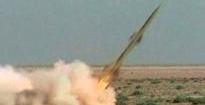Missiles Sent to Iran Might Not Work
 The Washington Post reports:
The Washington Post reports:
On Oct. 10, to celebrate its 65th anniversary as a one-party state, North Korea unveiled a new missile in the type of military parade that for decades has been a hallmark of authoritarian regimes. The North Koreans call the missile the Musudan.
The Musudan is now playing a starring role in reports this week prompted by WikiLeaks' release of U.S. diplomatic cables. One of the documents says that Iran has obtained 19 of the missiles from North Korea, prompting news reports suggesting that the Islamic republic can hit targets in Western Europe and deep into Russia - farther than Iran's existing missiles can strike.
The problem, however, is that there is no indication that the Musudan, also known as the BM-25, is operational or that it has ever been tested. Iran has never publicly displayed the missiles, according to experts and a senior U.S. intelligence official, some of whom doubt the missiles were ever transferred to Iran. Experts who analyzed Oct. 10 photographs of the Musudan said it appeared to be a mock-up.
The snapshot provided by the cable illustrates how such documents - based on one meeting or a single source - can muddy an issue as much as it can clarify it. In this case, experts said, the inference that Iran can strike Western Europe with a new missile is unjustified.
The 19-page document, labeled "secret," summarized a Dec. 22, 2009, meeting between 15 U.S. and 14 Russian officials who gathered as part of a bilateral program to monitor missile threats from Iran and North Korea. The two sides clashed repeatedly and agreed occasionally. The Russians claimed the Iranian missile program was not as much of a threat as the Americans feared and argued that the BM-25 might not even exist, dubbing it a "mysterious missile." Americans at the meeting acknowledged never seeing the new missile in Iran.
According to experts who are familiar with the Iranian program, the Americans and the Russians came to the meeting with competing agendas. The Americans were intent on emphasizing the Iranian threat because of their fears about Iran's alleged nuclear weapons programs and their support for a multibillion-dollar missile defense shield that is a priority of the Obama administration. The Russians focused on playing down the threat because they opposed the missile shield and because of their embarrassment that Russian technology was showing up in North Korean and Iranian missile systems.

